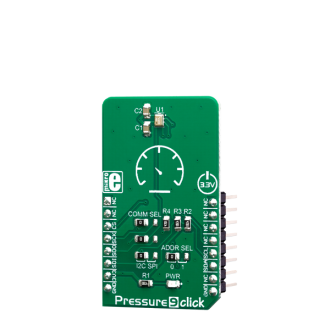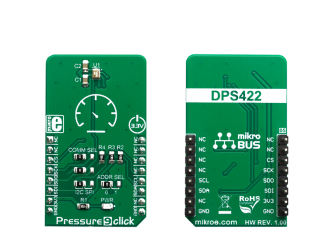
We strongly encourage users to use Package manager for sharing their code on Libstock website, because it boosts your efficiency and leaves the end user with no room for error. [more info]

Rating:
Author: MIKROE
Last Updated: 2019-03-27
Package Version: 1.0.0.0
mikroSDK Library: 1.0.0.0
Category: Pressure
Downloaded: 4768 times
Not followed.
License: MIT license
Pressure 9 Click is a digital barometric air pressure sensor Click board. It is equipped with the DPS422, barometric air pressure sensor, based on a capacitive sensor element.
Do you want to subscribe in order to receive notifications regarding "Pressure 9 click" changes.
Do you want to unsubscribe in order to stop receiving notifications regarding "Pressure 9 click" changes.
Do you want to report abuse regarding "Pressure 9 click".


Library Description
The library initializes and defines the I2C or SPI bus driver and drivers that offer a choice for writing data in register and reads data form register. The library includes function for read Pressure data in mBar and Temperature data in C. The user also has the function for update all calibration coefficients, function for configuration register and functions for get Pressure and Temperature raw data.
Key functions:
float pressure9_getTemperatureData() - Temperature data.float pressure9_getPressureData() - Pressure data.void pressure9_updateCalculationCoefficient() - Update all calibration coefficients.Examples description
The application is composed of the three sections :
void applicationTask()
{
float Temperature;
float Pressure;
char demoText[ 50 ] = {0};
Pressure = pressure9_getPressureData();
FloatToStr(Pressure, demoText);
mikrobus_logWrite(" -- Pressure : ", _LOG_TEXT);
mikrobus_logWrite(demoText, _LOG_LINE);
Temperature = pressure9_getTemperatureData();
FloatToStr(Temperature, demoText);
mikrobus_logWrite(" -- Temperature : ", _LOG_TEXT);
mikrobus_logWrite(demoText, _LOG_LINE);
mikrobus_logWrite("-----------------------------", _LOG_LINE);
Delay_ms( 500 );
}
Other mikroE Libraries used in the example:
I2CSPIUARTConversionsAdditional notes and informations
Depending on the development board you are using, you may need USB UART click, USB UART 2 click or RS232 click to connect to your PC, for development systems with no UART to USB interface available on the board. The terminal available in all MikroElektronika compilers, or any other terminal application of your choice, can be used to read the message.